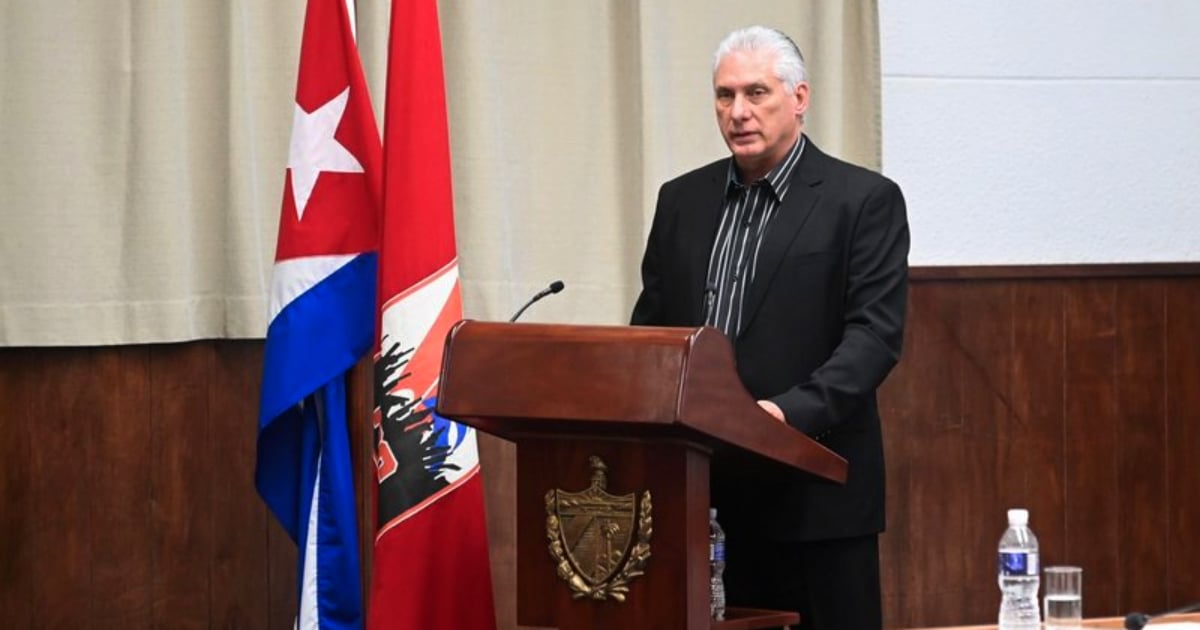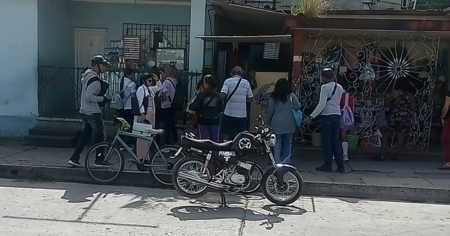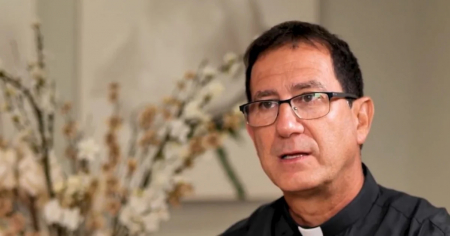
Related videos:
The Cuban regime announced the results of a study conducted by the Center for Socio-Political Studies and Opinion (CESPO), which claims that the majority of Cubans support the so-called "revolution" and its leaders.
The conclusions were presented during the discussion of the accountability report of the Political Bureau at the IX Plenary of the Communist Party of Cuba (PCC) by Secretary Roberto Morales Ojeda.
According to the report, the population maintains a sense of national pride and recognizes dictator Fidel Castro and General Raúl Castro as reference figures, despite the fact that the sociopolitical project built by both over more than 60 years—through violent and exclusionary domination—has condemned the nation to countless material and spiritual deficiencies, as well as economic difficulties that burden its citizens.
According to the press office of the PCC, the study emphasized that, despite dissatisfaction regarding high prices, transportation issues, food shortages, and housing problems, the population remains largely supportive of the regime's policies.
This supposed majority support contrasts sharply with the results of a survey conducted in mid-October by CiberCuba on the Telegram platform, aimed at gauging the opinion of Cuban citizens regarding the administration of ruler Miguel Díaz-Canel. The results were devastating, with 95% of Cubans disapproving of his leadership and 77% considering his performance to be "impossible to be worse."
The official stance contrasts sharply with the reality of the systemic crisis facing Cuba, which is the result of disastrous economic policies implemented by Díaz-Canel's government and its “continuity” of a totalitarian system that represses dissent, freedom of expression, and the right to genuine political participation, characteristic of democratic systems.
Driven to the limit by the ineptitude and blatant disregard of the regime's leaders towards its citizens, contemporary Cuban society is enduring the effects of inflation, impoverishment, widespread shortages, inequality, injustice, and the deterioration of public services. At the same time, it is common knowledge that a corrupt elite has captured the state, indulging in enrichment at the expense of the population.
Once again, the PCC and its entity for “socio-political studies and public opinion” are using state-controlled media (the only legal outlets in the country) to spread their outdated propaganda rhetoric and to maintain indoctrination among the population, pretending that the so-called “revolution” and its current leadership possess legitimacy derived from the support of “the masses.”
The study methodology: A tool for ideological control
Currently directed by Rosario del Pilar Pentón Díaz, CESPO was established in September 1967 as a tool of the Communist Party to gather the opinions of the population and has been collecting data for decades under a methodological framework designed to reinforce the ideological control of the regime.
In theory, the study relies on questionnaires and group interviews aimed at measuring variables such as mood, perceptions of the political system, and future expectations. However, the results appear to be designed to reinforce the official narrative rather than reflect the genuine concerns of the citizens.
The methodological proposal suggests a "scientific" analysis of the sociopolitical climate, but it is aimed at ensuring that the results serve as a tool for political direction. This is reflected in the conclusions of the report, which emphasize the "majority adherence" to the socialist system despite the evident economic and social tensions affecting the country.
A portrait of propaganda in a context of crisis
The announcement of the study comes against a backdrop of a severe economic and social crisis. Uncontrolled inflation, the collapse of basic services, and mass emigration have eroded trust in the regime's institutions.
However, CESPO uses the results of the study to validate the political model and justify the policies of the Díaz-Canel government, arguing that the difficulties are a result of "enemy propaganda" rather than structural flaws in the system.
Furthermore, the report emphasizes the role of ideology in consolidating power. In 2017, the then deputy scientific director of CESPO, Marcela González Pérez, acknowledged to Trabajadores that this research is crucial for "strengthening ties with the Party and the youth," reflecting the use of sociological studies as a mechanism to perpetuate ideological hegemony.
A reality that contradicts the results
In contrast to the study's conclusions, the daily reality for Cubans is characterized by hardship. Long lines to obtain food, frequent power outages, and a lack of medications have created an atmosphere of frustration and despair.
Mass emigration, with record numbers in recent years, is another indicator of the population's discontent, as people seek to escape a system that does not guarantee opportunities or quality of life.
Therefore, the study presented by CESPO is perceived more as a propaganda tool than as an objective analysis of the country's sociopolitical reality. Although the regime insists that the so-called "revolution" has the support of the majority, evidence points to a disconnect between the official narrative and the daily experiences of the citizens.
The CESPO report on the sociopolitical climate in Cuba highlights how the regime uses sociological research as a tool to perpetuate ideological control.
Although it presents a majority support for the regime, its conclusions are clearly intended to justify the legitimacy of the political system amidst an unprecedented crisis.
The disconnect between the official discourse and the reality experienced by Cubans highlights the limitations of a model that prioritizes propaganda over concrete solutions to the country's problems.
Frequently Asked Questions about Support for the Cuban Regime and the Sociopolitical Crisis
Is it true that most Cubans support the regime and the revolution?
According to a study by the Center for Sociopolitical and Opinion Studies (CESPO), the majority of Cubans support the regime and the revolution. However, this study has been criticized for being a propaganda tool of the government, intended to reinforce the official narrative rather than reflect the genuine concerns of the citizens. In contrast, a survey by CiberCuba revealed a 95% disapproval rating for President Miguel Díaz-Canel.
What are the main criticisms of the CESPO study on support for the regime?
The CESPO study has been criticized for its lack of objectivity, as it is seen as a propaganda tool intended to reinforce the ideological control of the Cuban regime. The conclusions drawn from the study stand in stark contrast to the economic and social crisis facing the country, as well as indicators of discontent such as mass emigration and the numerous protests recorded on the island.
What does the Cuban government say about the current economic and social crisis?
The government of Miguel Díaz-Canel acknowledges the crisis but attributes the difficulties mainly to the U.S. embargo and "enemy propaganda." However, economists and critics point out that the causes are internal, such as a lack of planning and government missteps. The president has promised that Cuba will overcome the crisis, but he has not presented a clear strategy or a defined timeline to achieve it.
How has the Cuban population reacted to the current situation and the government's statements?
The Cuban population has displayed a high degree of frustration and skepticism towards the government's promises, as they have not experienced tangible improvements in their daily lives. The scarcity of food, medicine, and basic services continues to impact Cubans, who have turned to protests and demonstrations to express their discontent. The government's repression and discrediting of the protesters further exacerbate social unrest.
Filed under:






